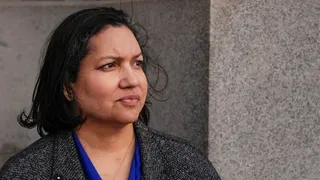October 11, 2011
Seattle Health Plans to Cover Transgender City Employees
Shaun Knittel READ TIME: 3 MIN.
The Seattle Office of Civil Rights announced on Friday, Oct. 7, that the city's health care plans will cover procedures for transgender municipal employees.
The policy, which will take effect on Jan. 1, places Seattle alongside San Francisco in covering their trans employees. San Francisco began offering these benefits to their trans employees, retirees and their dependents in 2001.
The sudden announcement capped six months of negotiations between several city commissions, the mayor, the City Council and a coalition of city unions. The announcement was timed to coincide with the annual open enrollment period in which city employees choose their healthcare plans.
"People are skeptical of government," said LGBT Commission Co-Chair Tiffany Nelson. "They did the right thing - and in a timely way."
According to Nelson, agreement on the changes had been reached some time ago, "but the city said, 'Let's wait till the open enrollment period before we make a formal announcement.'"
"It's interesting," she continued, "When we first met with the City's H.R. department last spring, my goal was to have this done by open enrollment. Everyone said, 'Oh, it just can't happen that fast.'"
Nelson credited the "concerted efforts" of five city commissions-the LGBT Commission, the Commission for People with Disabilities, the Human Rights and Women's Commissions and the Immigrant and Refugee Advisory Board. Councilmembers Bruce Harrell, Sally Clark, Tom Rasmussen and Mike O'Brien also wrote letters of support for the proposal to make employee healthcare plans trans-inclusive.
Nelson said she was surprised by the strong support the proposal received from the unions that represent city employees.
"When we met with the union reps on the healthcare committee - at first I was reluctant to meet with them - all these straight white guys from the union," she said. "They were extremely supportive. It was a wonderful surprise for me."
Julie Nelson, director of the Seattle Office for Civil Rights, the agency that provides staff support to all five commissions, also welcomed the move.
"This is a great example of the role commissions can play to change city policy," she said. "As we continue to work for social justice, I look forward to more collaboration with our commissions to create greater equity in city government."
"I am so pleased to see our policies reflect our values; our value that we will not discriminate based on one's sexual identity," added Harrell. "We encouraged our Health Care Committee to remove healthcare exclusions for the city of Seattle's transgender employees and they did."
Gay City Councilman Tom Rasmussen is among some Seattle officials who were taken aback when they found out in March that healthcare benefits for the city's trans employees were not already provided. Five commissioners wrote to Harrell, chair of the Council's Energy, Technology and Civil Rights Committee, urging the city to amend the health plans it offers to its employees to cover treatments necessary for its trans employees.
The city's existing benefit plan excluded coverage for what it termed "sex change" which was defined as, "any treatment, drug, service, or supply related to changing sex or sexual characteristics." These included surgical procedures to alter the appearance or function of the body; hormones or hormone therapy; prosthetics and medical or psychological counseling.
The commission pointed out that city employees denied health care coverage because of their gender identity could develop debilitating secondary medical conditions. It further stated that these employees face higher risk of suicide and experience increased psychological distress.
"Sometimes we learn only when a lack of policy is brought to our attention," said Rasmussen. "I'm glad the city responded quickly."
Marsha Botzer, co-founder and co-chair of the Ingersoll Gender Center, said she is thrilled with the announcement.
"I appreciate the city doing this," she said. "I really want to credit the LGBT commission and especially the new, intensely active members-they reached out to older activists and really made it happen."
Shaun Knittel is an openly gay journalist and public affairs specialist living in Seattle. His work as a photographer, columnist, and reporter has appeared in newspapers and magazines throughout the Pacific Northwest. In addition to writing for EDGE, Knittel is the current Associate Editor for Seattle Gay News.





